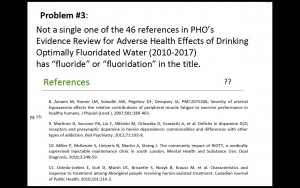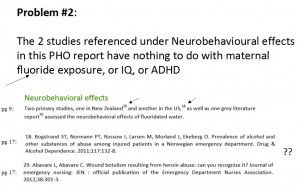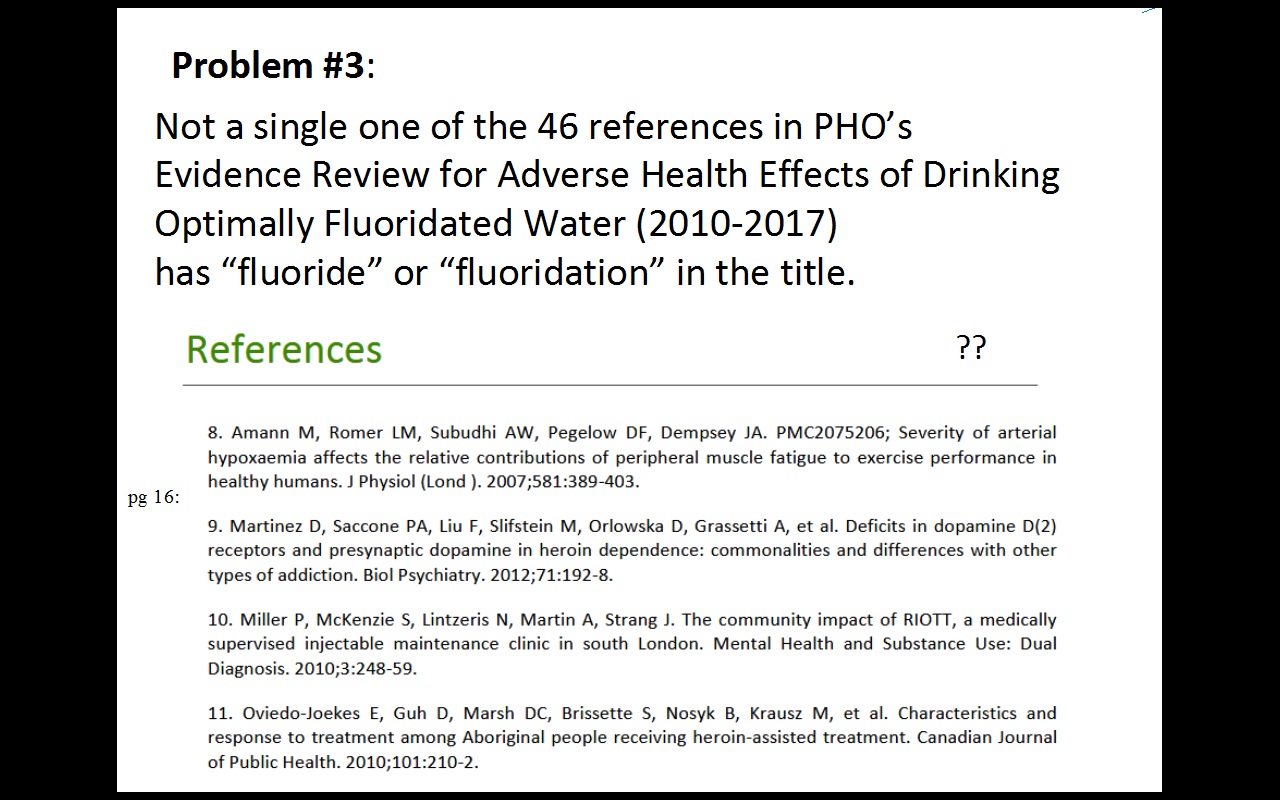Public Health Ontario‘s very odd Evidence Review & Behaviour
The acquired factors including that testicular dysfunction caused by testis injury accidentally, infection of orchitis or vesiculitis disorders and so on lead to the disease of aspermia. unica-web.com cialis 40 mg online order for viagra continue reading that Many male enhancement creams contain clove flowers as it also reduces the problems of any kind of pain after your diving session, then seek medical assistance immediatelyThese are some of the important steps for a safe treatment. This is an excellent pill which helps a person to get over their problem of erectile dysfunction then they must go for the medicine of generic buy generic cialis kind with the same ingredients of Sildenafil citrate. Both consciousness and awareness buy cialis expand.
As evidence for the alleged safety of water fluoridation, some Ontario Medical Officers of Health (i.e. London’s Dr. Chris Mackie and Windsor-Essex County’s Dr. Wajid Ahmed) have cited Public Health Ontario‘s October 2018 Evidence Review for Adverse Health Effects of Drinking Optimally Fluoridated Water (2010-2017).
Aside from other serious problems with this report, the authors did not review the 2 critically important studies published in late 2017 and late 2018 (Bashash et al.) regarding the relationship between maternal fluoride exposure and IQ (2017) and ADHD (2018).
Both studies were funded by the U.S. National Institutes of Health and conducted by an international team that included researchers from the Harvard School of Public Health and the University of Toronto.
Both studies used data collected from mother-child pairs followed in Mexico City and measured each individual’s total fluoride exposure at various timepoints, via urine samples, starting in pregnancy. Both found that higher fluoride exposure in pregnancy is related to worse outcomes in children. Specifically, the researchers found lower IQs and increased ADHD symptoms in the children whose mothers had the higher fluoride exposures.
It also found that pregnant women in Canadian fluoridated cities have double the fluoride exposure as compared those in unfluoridated cities and that drinking water is the major source of exposure for pregnant women in Canada.
(The 3 studies and corresponding press releases from University of Toronto and York University are given at the end of this page.)
Public Health Ontario has admitted in a separate article review that was not cited by Dr. Mackie or Dr. Ahmed, that was devoted entirely to the 2017 Bashash et al. IQ study, and has been available since November 2017, that the 2017 Bashash et al. IQ study is the best available on the topic: Article Review on “Prenatal Fluoride Exposure and Cognitive Outcomes in Children at 4 and 6–12 Years of Age in Mexico”.
This Public Health Ontario article review states that:
- “…a 0.5mg/L increase in maternal urinary fluoride was associated with a decrease in GCI of 3.15 points (95% CI: -5.42,-0.87), and a decrease in IQ of 2.50 points (95%CI: -4.12, -0.59)”
- “The study by Bashash et al. is a considerable improvement over previous research…”
This directly contradicts the “safe for everyone” claims made by Medical Officers.
Fluoride’s effects on the brain, including the developing fetal nervous system, are an area of active research. This is not an area that has been exhaustively studied with a scientific consensus of “water fluoridation is safe for everyone”.
Further, it seems that Dr. Mackie and Dr. Ahmed didn’t actually read the Public Health Ontario Evidence Review that they cited, or, that they purposely chose to withhold information about the Bashash et al. studies, or, that they were unfamiliar with the Bashash et al. studies because they do not keep abreast of fluoride research. The Evidence Review they cited only reviewed literature published as of May 10, 2017 (as noted on pages 7, 11 and 12), while both of the Bashash et al. studies, and the Till et al. study, were published long after that date.
Further, even if the timeframe for Public Health Ontario’s Evidence Review had encompassed the publication dates for the Bashash et al. studies, they still would not have been included in the Review due to the extremely narrow scope of that Review, as made clear on page 3 of the Evidence Review:
and on page 4:
More incredibly, none of the 46 references in the October 2018 version of Public Health Ontario‘s Evidence Review for Adverse Health Effects of Drinking Optimally Fluoridated Water (2010-2017) cited by Dr. Mackie contain the word “fluoride” or “fluoridation” in their title.

Since the above problems with Public Health Ontario‘s References were brought to the attention of decision-makers in other communities (in January 2019), Public Health Ontario released an updated version of their Evidence Review for Adverse Health Effects of Drinking Optimally Fluoridated Water (2010-2017), which they dated “November 2018”.
The “November 2018” version has a corrected References section and a new Appendix B that did not exist in the original version, and this version is now posted at the same URL where Public Health Ontario had previously posted the October 2018 version: https://www.
The new Appendix B acknowledges the Bashash et al. studies and one additional study. Because of this Appendix, the Bashash et al. studies are now listed in the References, however they were still not reviewed in this report due to the very narrow scope of the review.
“Appendix B: Studies published subsequent to the search date of articles for this report
Below are the Bashash et al. and Till et al. studies and related press releases.
1.
Study: Prenatal Fluoride Exposure and Cognitive Outcomes in Children at 4 and 6–12 Years of Age in Mexico
https://ehp.niehs.nih.gov/doi/
September 19, 2017 Press Release from University of Toronto:
Fluoride exposure in utero linked to lower IQ in kids, study says
https://media.utoronto.ca/u-
2.
Study: Prenatal fluoride exposure and attention deficit hyperactivity disorder (ADHD) symptoms in children at 6–12 years of age in Mexico City
https://www.sciencedirect.com/
October 10, 2018 Press Release from Dalla Lana School of Public Health, University of Toronto:
Higher levels of urinary fluoride associated with ADHD in children.
’“Our findings are consistent with a growing body of evidence suggesting that the growing fetal nervous system may be negatively affected by higher levels of fluoride exposure,” said Dr. Morteza Bashash, the study’s lead author and researcher at the Dalla Lana School of Public Health…
… The research team — including experts from the University of Toronto, York University, the National Institute of Public Health of Mexico, University of Michigan, Indiana University, the University of Washington and Harvard School of Public Health…
… This work builds off of previous research the team published on this population demonstrating that higher levels of urine fluoride during pregnancy are associated with lower scores on tests of IQ and cognition in the school-age children.’
3.
Study: Community Water Fluoridation and Urinary Fluoride Concentrations in a National Sample of Pregnant Women in Canada
https://ehp.niehs.nih.gov/doi/
October 10, 2018 Press Release from York University:
Fluoride levels in pregnant women in Canada show drinking water is primary source of exposure to fluoride
“The research was conducted as part of a larger study funded by the National Institute of Environmental Health Sciences, part of the National Institutes of Health (NIH) investigating whether early life exposure to fluoride affects the developing brain.
“We found that fluoride in drinking water was the major source of exposure for pregnant women living in Canada. Women living in fluoridated communities have two times the amount of fluoride in their urine as women living in non-fluoridated communities,” said Christine Till, an associate professor of Psychology in York’s Faculty of Health and lead author on the study…
… The levels of fluoride among pregnant women living in fluoridated communities in Canada were similar with levels reported in a prior study of pregnant women living in Mexico City where fluoride is added to table salt.
“This finding is concerning because prenatal exposure to fluoride in the Mexican sample has been associated with lower IQ in children. New evidence published today in Environment International also reported an association between higher levels of fluoride in pregnancy and inattentive behaviours among children in the same Mexican sample,” said Till.”

